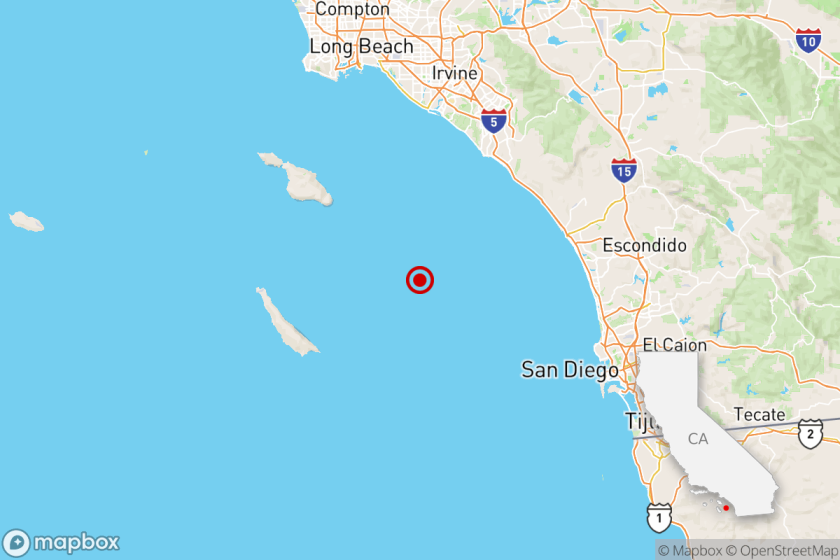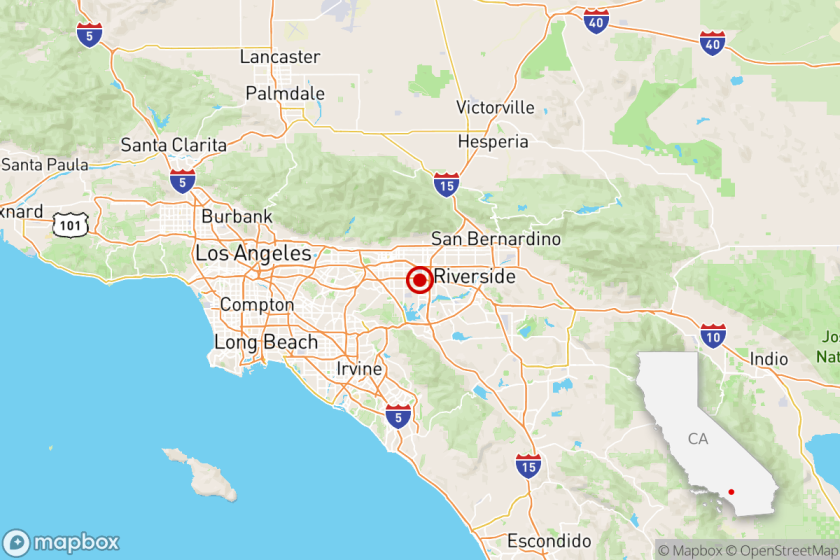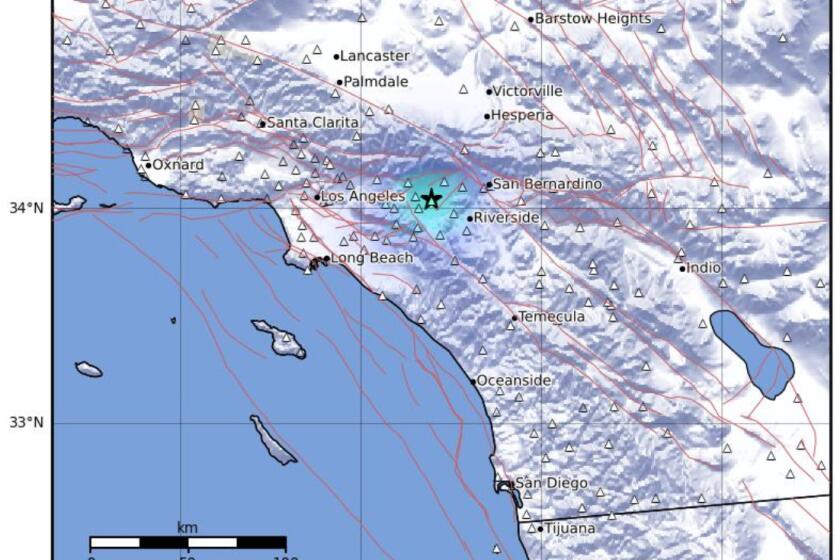Risks Abound in Contracting for Quake Repairs
Anyone who knows how to use a hammer, it seems, has acquired a new specialty: earthquake repair. Across the Los Angeles Basin, at roadsides and on chain-link fences, contractors are posting signs touting their skills. “Quick Earthquake Repair!” shouts a hand-painted sign in Granada Hills. “Quake Aid Contractors,” reads another.
In their zeal for work, builders and would-be builders have been leaving flyers in mailboxes and on windshields, and shoving them inside tents where families slept outside damaged homes. Handymen have 800 numbers.
“You’re not even awake, and they just attack you,” said Nancy Spitz of Northridge, who camped for several days with her family outside a home that lost two chimneys, a block wall and part of its roof in the quake. “They don’t let you sleep.”
Amid the tumultuous shaking, the Northridge quake has unleashed a residential construction boom not seen in this basin since its citrus groves were cleared for tract homes decades ago. The promise of work, millions upon millions of dollars of it, is drawing licensed and unlicensed contractors, day laborers and handymen from other counties and states to this newfound land of opportunity.
An incomplete tally by building inspectors in Los Angeles and Santa Monica suggests the magnitude of the residential reconstruction job ahead: nearly 6,500 single-family homes have been declared seriously damaged or unsafe for occupancy in Los Angeles. The repair tab for homes, condominiums and apartments exceeds $2 billion.
In neighborhoods spared severe damage, the quake tumbled chimneys and toppled block walls that need to be rebuilt or replaced. Los Angeles is issuing 150 building permits daily, five times the usual number, a pace certain to quicken when homeowners receive insurance money and loans to finance major repairs.
With so much work up for grabs in Los Angeles, unqualified builders--and outright con artists--are transforming themselves into “contractors” for the cost of printing flyers or business cards. Authorities say homeowners who have lost much in the quake stand to lose more if they are not careful about whom they hire.
Although authorities say most of California’s estimated 580,000 licensed and unlicensed contractors do satisfactory work, officials have logged about 300 complaints about gouging on prices for everything from chimney and roof repair to water heater and sewer line replacements. Opportunistic builders who advertised free estimates are charging for them.
Usually, the Contractors State License Board receives 300 to 500 complaints a year from the San Fernando Valley, where the quake was centered. But Larry Chaffee, assistant regional director of the board, said based on past disasters, he expects a threefold jump in complaints from the Valley and elsewhere in the quake zone--despite efforts to limit problems with high-profile police sweeps and a hot line that consumers can call.
Florida’s Hurricane Andrew and the Bay Area’s Loma Prieta quake left swaths of destruction that attracted thousands of workers, creating an atmosphere of confusion that led to scattered abuse.
Officials in Florida are still receiving complaints about contractor incompetence and fraud, nearly two years after the hurricane damaged or destroyed 87,000 homes. They estimate that at least 5% of those homeowners were ripped-off, paying contractors an average of $31,000 for work not done or done poorly. Many defrauded South Florida homeowners have been forced to pay for repairs twice, hiring new contractors to complete the work when building officials ordered substandard repairs removed.
In Los Angeles, officials say they are prepared to do the same when substandard work is discovered. Although too swamped with safety inspections to check construction, the city is developing a computerized list of quake-damaged properties that inspectors will match against building permits later on to check for illegal work, said Dave Kiem, principal building inspector for the Los Angeles Department of Building and Safety. Homeowners will be ordered to tear out work that does not meet code, he said.
County officials are compiling a virtual catalogue of complaints from earthquake victims who say they were pressured to pay steep prices for immediate repairs. Two-thirds of the complaints were about plumbers, some of whom were accused of selling water heaters for as much as $1,000. The allegations are under investigation by the Los Angeles city attorney’s office, and no charges have yet been filed.
Santa Monica Deputy City Atty. Kimery Shelton said anxious homeowners are most vulnerable to the hard sell: “They want (work) done immediately rather than sleep on the street.”
Take the case of Woodland Hills homeowner Helen Holmes. Warned by a contractor that her chimney could collapse with “the next aftershock,” she paid $1,500 to have it removed. Her relief turned to anger, she said, when neighbors told her they had paid a different contractor $700 for similar work.
Daylene Carroll of Hollywood said she ended a high-pressure three-way phone conversation with two chimney contractors when she overheard a voice on the other end of the line cry: “Charge her up the gazoo.”
Other contractors, some homeowners say, are charging up to $60 for estimating repairs.
Some contractors admit that in the confusion immediately after the quake, mistakes were made. The owner of Hollywood-based Chimney Jack, Gary Brennan, said he has refunded money to customers overcharged by an “eager beaver” employee.
Contractors say most complaints result from sticker shock affecting homeowners facing massive repairs and confused by quotes from day laborers, who may charge half what a licensed contractor charges. And some contractors say they deserve higher fees than usual because the work is hazardous and they are putting in overtime.
For homeowners eager to get repair work done, sorting through contractor solicitations is work in itself. Day laborers have been canvassing neighborhoods, agreeing to knock down chimneys for $150. Contractors who are looking for work repairing block walls have been dumping stacks of flyers at disaster relief centers.
Advertising circulars carry pages of contractor listings, many providing state contractor license numbers. In a check of a dozen “contractors” advertising in the Feb. 3 issue of the Recycler, The Times found that two had suspended licenses for failure to carry workers’ compensation insurance, one had an expired license that had belonged to someone else, and one had a phony license number.
“That’s pretty typical,” said Anne Armstrong, who runs a contractor referral service in Laguna Hills. She estimates that one-quarter to one-third of contractors who run ads stating that they are licensed do not have an active license, so consumers must research contractors’ credentials before hiring one.
That is if homeowners are lucky enough to get that far. As some are discovering, the blizzard of solicitations does not mean contractors will come when called.
Shelley Armas said it took 26 days and many phone calls to find a licensed contractor willing to estimate damage to her Northridge home. Many contractors failed to return messages. Those who did said they were too busy or wanted to be paid up to $60 for an estimate. One contractor who had promised to come was a no-show.
“It feels good to finally have someone here,” Armas said, as her husband led the contractor on a tour of cracked walls, fallen tile and leaky water pipes on a recent Saturday. “Who knows when the work will finally get done?”
The Contractors State License Board ran into the same problem when setting up an undercover sting for unlicensed contractors at a quake-damaged Northridge home. All but three of 40 contractors contacted by an undercover agent said they were too busy to provide an estimate. One of the three contractors who agreed to come did not show up.
Nonetheless, state Department of Consumer Affairs Director Jim Conran said there are enough licensed contractors to do the work. Only licensed contractors can legally perform repairs of more than $300.
To become licensed, a contractor must have experience in the trade, pass a written test and have workers’ compensation insurance in case a worker gets hurt. Contractors are also required to post a $5,000 bond so some money is available to repay customers in the event of fraud or other problems.
Using an unlicensed contractor could leave a homeowner with no bond to tap if they are cheated and vulnerable to lawsuits from workers injured on the job. Unlicensed contractors cannot get building permits, so their work generally does not get inspected.
The relationship is risky for unlicensed contractors, too. They cannot sue to enforce their contracts and, since the Northridge quake, they face possible felony charges for working in a disaster area.
Unlike Florida, where the National Guard helped arrest 500 contractors, undermanned authorities here are counting on heavy doses of publicity to scare off the state’s estimated 300,000 unlicensed contractors from competing with licensed contractors for jobs. Stings and sweeps, no matter how small, have become media events.
With a hidden camera for “NBC Dateline” rolling, a four-hour sting in Northridge recently ended with a single arrest: an unlicensed painter who was handcuffed and cited with a criminal misdemeanor. A Reseda contractor with a suspended license was allowed to go with a warning. Conran, the consumer affairs official, was on hand after flying from Sacramento to, as he put it, “stop these lice.” A Times reporter and photographer also attended.
A few days earlier, two local television news crews accompanied Los Angeles Police Department fraud investigators and agents from the Contractors State License Board on a sweep through Granada Hills and Porter Ranch. There were four arrests.
Since the Jan. 17 quake, at least 17 people have been arrested, four on felony charges for working in a declared disaster area without a license. One was handyman Mark Monday, who was caught in a Burbank sting filmed by KCBS-TV as he gave undercover agents a $600 bid to tear down a chimney and haul it away.
“If these charges stick, they’ll ruin me,” said Monday, a part-time handyman and licensed security guard. In his defense, Monday has collected letters from longtime clients--apartment management firms and homeowners--who attest that he has never posed as a contractor and say he has done excellent work.
The prosecutor handling the felony cases acknowledges that they do not involve typical bad guys. “I’m sure they are hard-working people just trying to make a living,” said John Luder, deputy district attorney.
Luder said he plans to seek community service and fines rather than jail time for most of those who are convicted. Under new guidelines, he said, felony charges will be filed only against people doing structural work worth at least $3,000. “Our concern is with work posing safety risks to consumers,” Luder said.
Authorities anticipate that organized gangs of con artists who gravitate from disaster to disaster will arrive in the region. Police say these people pose as contractors, take hefty deposits for little or no work and run. The scams will not appear for several more weeks or months, until homeowners receive insurance payments and bank loans to finance major reconstruction, police said.
“They know that we are looking at them and investigating them,” said Lt. Ken Welty of the LAPD’s major fraud unit. “They are not just unlicensed contractors; they’re crooks.”
In the end, authorities say, homeowners must protect themselves against the perils of the reconstruction era, Los Angeles style.
Reseda homeowner Robert Yetter succeeded the first time out. His neighbor leased a chain-link fence for $300. Yetter bought his for $140.
Now Yetter is dealing with his damaged block wall. A contractor wants $4,000 to rebuild it. A man who helped Yetter’s wife gather bricks and left his card one afternoon will do it for less. The man is not licensed and has no insurance, but if properly supervised, Yetter reasons, everything should be OK.
“Hey, it’s like anything else,” he said. “It’s buyer beware.”
Tips for Homeowners With Quake Damage
Here are some steps that consumer organizations and law enforcement officials advise you to follow to make sure you get what you pay for when hiring a contractor:
* Ask the contractor for his state license number and call the Contractors State License Board at (800) 321-2752 to verify it. Ask if there are outstanding complaints against the contractor. There are 43 types of licenses, so make sure the contractor is licensed for the work you need done.
* Ask the contractor about his workers’ compensation insurance and call the carrier to verify coverage. You could be liable for the contractor’s work-related injuries if the insurance is not valid.
* Don’t be pressured to make a decision. Get references and check them, and take time to get other estimates.
* Never pay a deposit at the first meeting. If you are asked for a deposit, end discussions.
* Once you have selected a contractor, insist in writing that the contractor must show you receipts for all materials and payments to subcontractors before you pay him for the job. If a contractor stiffs his suppliers, they can slap mechanics liens on your property, even if you have paid the contractor.
* Don’t pay cash and never make a down payment larger than 10% of total cost of the work, or $1,000, whichever is less. Agree to a payment schedule and never let payments get ahead of work done.
* If you hire an unlicensed contractor, be aware that you could be sued for on-the-job injuries and that the work may not be up to code.
Sources: Los Angeles County district attorney’s office, Los Angeles city attorney’s office, Contractors State License Board and consumer groups.
More to Read
Sign up for Essential California
The most important California stories and recommendations in your inbox every morning.
You may occasionally receive promotional content from the Los Angeles Times.










